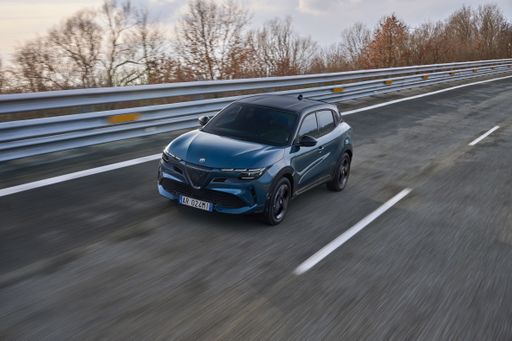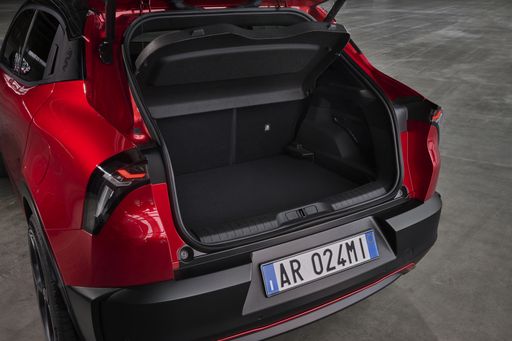Alfa Romeo Junior vs Fiat Pandina – Which model is better for everyday use?
Everyday use, family trips or long-distance drives – here’s where the differences show.
Discover whether Alfa Romeo Junior or Fiat Pandina fits your lifestyle better.
Costs and Efficiency:
Looking at overall running costs, both models reveal some interesting differences in everyday economy.
Fiat Pandina has a decisively advantage in terms of price – it starts at 14100 £, while the Alfa Romeo Junior costs 25700 £. That’s a price difference of around 11537 £.
Fuel consumption also shows a difference: Alfa Romeo Junior manages with 4.80 L and is therefore slight more efficient than the Fiat Pandina with 5 L. The difference is about 0.20 L per 100 km.
Engine and Performance:
Power, torque and acceleration say a lot about how a car feels on the road. This is where you see which model delivers more driving dynamics.
When it comes to engine power, the Alfa Romeo Junior has a clearly edge – offering 280 HP compared to 70 HP. That’s roughly 210 HP more horsepower.
In acceleration from 0 to 100 km/h, the Alfa Romeo Junior is convincingly quicker – completing the sprint in 5.90 s, while the Fiat Pandina takes 13.90 s. That’s about 8 s faster.
In terms of top speed, the Alfa Romeo Junior performs distinct better – reaching 206 km/h, while the Fiat Pandina tops out at 164 km/h. The difference is around 42 km/h.
There’s also a difference in torque: Alfa Romeo Junior pulls significantly stronger with 345 Nm compared to 92 Nm. That’s about 253 Nm difference.
Space and Everyday Use:
Whether family car or daily driver – which one offers more room, flexibility and comfort?
Both vehicles offer seating for 5 people.
In curb weight, Fiat Pandina is clearly perceptible lighter – 1055 kg compared to 1380 kg. The difference is around 325 kg.
In terms of boot space, the Alfa Romeo Junior offers clearly more room – 415 L compared to 225 L. That’s a difference of about 190 L.
In maximum load capacity, the Alfa Romeo Junior performs noticeable better – up to 1280 L, which is about 410 L more than the Fiat Pandina.
When it comes to payload, Alfa Romeo Junior slight takes the win – 420 kg compared to 385 kg. That’s a difference of about 35 kg.
Who comes out on top?
Overall, the Alfa Romeo Junior shows itself to be outperforms in nearly all aspects and secures the title of DriveDuel Champion.
It convinces with the more balanced overall package and proves to be the more versatile choice for everyday use.
 @ Alfa Romeo / Stellantis Media
@ Alfa Romeo / Stellantis Media
Alfa Romeo Junior
Alfa Romeo Junior
The Alfa Romeo Junior captures the essence of Italian design with its sleek lines and compact dimensions, making it an icon of elegance and performance. With a spirited driving experience and a charming retro aesthetic, it appeals to enthusiasts and casual drivers alike. This delightful car embodies the brand's rich heritage while remaining a fun and engaging option for those seeking a unique automotive experience.
details @ Alfa Romeo / Stellantis Media
@ Alfa Romeo / Stellantis Media
 @ Alfa Romeo / Stellantis Media
@ Alfa Romeo / Stellantis Media
 @ Alfa Romeo / Stellantis Media
@ Alfa Romeo / Stellantis Media
Fiat Pandina
The Fiat Pandina, commonly referred to as a spirited urban companion, boasts a charm that's both nostalgic and contemporary. Its compact design embraces city streets with an agile grace, making it an excellent choice for bustling environments. With a reputation for reliability and an economical approach, the Pandina continues to win hearts as a beloved everyday vehicle.
details
 @ Alfa Romeo / Stellantis Media
@ Alfa Romeo / Stellantis Media
|
|
|
|
|
Costs and Consumption |
|
|---|---|
|
Price
25700 - 41600 £
|
Price
14100 - 18000 £
|
|
Consumption L/100km
4.8 - 5.4 L
|
Consumption L/100km
5 - 5.1 L
|
|
Consumption kWh/100km
15.1 - 17.5 kWh
|
Consumption kWh/100km
-
|
|
Electric Range
344 - 410 km
|
Electric Range
-
|
|
Battery Capacity
0.4 - 51 kWh
|
Battery Capacity
-
|
|
co2
0 - 119 g/km
|
co2
113 - 116 g/km
|
|
Fuel tank capacity
44 - 45 L
|
Fuel tank capacity
38 L
|
Dimensions and Body |
|
|---|---|
|
Body Type
SUV
|
Body Type
Hatchback
|
|
Seats
5
|
Seats
4 - 5
|
|
Doors
5
|
Doors
5
|
|
Curb weight
1380 - 1689 kg
|
Curb weight
1055 kg
|
|
Trunk capacity
340 - 415 L
|
Trunk capacity
225 L
|
|
Length
4173 mm
|
Length
3635 - 3705 mm
|
|
Width
1781 mm
|
Width
1643 - 1662 mm
|
|
Height
1505 - 1538 mm
|
Height
1551 - 1657 mm
|
|
Max trunk capacity
1205 - 1280 L
|
Max trunk capacity
870 L
|
|
Payload
390 - 420 kg
|
Payload
365 - 385 kg
|
Engine and Performance |
|
|---|---|
|
Engine Type
Electric, Petrol MHEV
|
Engine Type
Petrol MHEV
|
|
Transmission
Automatic
|
Transmission
Manuel
|
|
Transmission Detail
Dual-Clutch Automatic, Reduction Gearbox
|
Transmission Detail
Manual Gearbox
|
|
Drive Type
Front-Wheel Drive, All-Wheel Drive
|
Drive Type
Front-Wheel Drive
|
|
Power HP
136 - 280 HP
|
Power HP
70 HP
|
|
Acceleration 0-100km/h
5.9 - 9.1 s
|
Acceleration 0-100km/h
13.9 - 14.7 s
|
|
Max Speed
150 - 206 km/h
|
Max Speed
155 - 164 km/h
|
|
Torque
230 - 345 Nm
|
Torque
92 Nm
|
|
Number of Cylinders
3
|
Number of Cylinders
3
|
|
Power kW
100 - 207 kW
|
Power kW
51 kW
|
|
Engine capacity
1199 cm3
|
Engine capacity
999 cm3
|
General |
|
|---|---|
|
Model Year
2024 - 2025
|
Model Year
2024 - 2025
|
|
CO2 Efficiency Class
A, C, D
|
CO2 Efficiency Class
D, C
|
|
Brand
Alfa Romeo
|
Brand
Fiat
|
What drive types are available for the Alfa Romeo Junior?
Available configurations include Front-Wheel Drive or All-Wheel Drive.
The prices and data displayed are estimates based on German list prices and may vary by country. This information is not legally binding.
